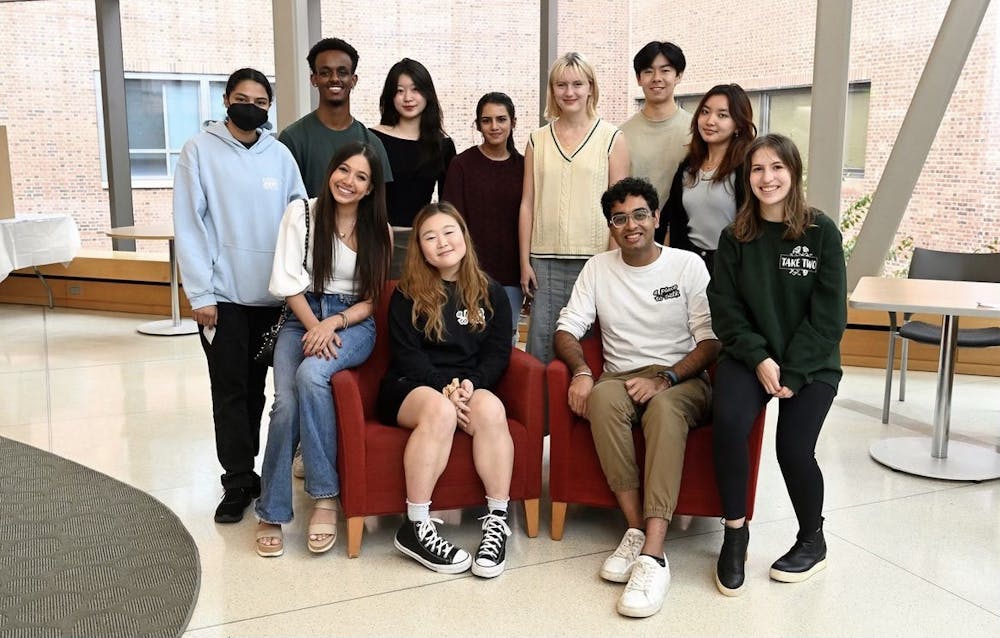On Monday, Nov. 13, Hopkins students celebrated World Kindness Day at the Breezeway with flowers and notes with positive affirmations. This is an annual event hosted by A Place To Talk (APTT) to spread kindness on campus during the stressful midterm season.
APTT is a peer listening group that aims to create a space for students to freely drop by and talk about anything, from serious concerns to daily happenings. The core mission of the organization is to provide mental health support for the undergraduate student body.
In an interview with The News-Letter, Co-Director Daivik Chawla highlighted that the organization is different from other mental health support groups because it is completely peer-led and focuses on listening to people’s stories.
“I feel most resources in general tend to give solutions or try to help you find an answer. But APTT provides support for people without giving any advice,” he said. “I think having this space where you can just express how you're feeling without necessarily reaching a conclusion is something that's really unique.”
Founded in 1983, the organization celebrated its 40th anniversary last month. Chawla noted that one of his favorite moments of being in the organization so far was this celebration, during which club alumni were invited to share their experiences in APTT.
“The club has had such a special place in their hearts, and it's impacted what they ended up doing professionally,” he said. “Even those who didn't go into the mental health field spoke about skills that stayed with them and continued to have an impact in their daily lives. It made me realize how valuable this organization was.”
Over the years, APTT has evolved in various ways. According to Rachel Lee, co-director of APTT, one of the APTT rooms was originally located in AMR I. However, it was relocated to Brody Learning Commons about five years ago. Now, students can visit and discuss their feelings with trained peer listeners in Brody 4010 or Wolman Hall.
In an interview with The News-Letter, Lee stated that this change reflected the organization’s effort to help a larger student population.
“Not a lot of people can access AMR or Wolman — usually they’re more accessible to freshmen. We feel that opening this room [in Brody] really helped us reach more students,” she said.
Currently, there are 62 members in APTT, including trainees. Before officially joining the team as a peer listener, all members go through 50 hours of formal training, which covers topics from crisis intervention to mental health first aid training. The training is led by an internal training director but is also overseen by a counselor at the Counseling Center.
Co-Public Relations Chair Sara Ros shared in an interview with The News-Letter that her first experience with APTT was as a freshman before she joined the club.
“I was having a really hard day and I knew [APTT] was a resource. I paced in front of the APTT room for 20 minutes thinking... ‘I wish to go in there but I'm scared,’” she said. “I went in, and it was really helpful. They just listened to me; it was non-judgmental, and I appreciated it a lot. I don't know where else on campus to go for that.”
All three members shared that they were initially inspired to join the organization because of their passion for making a positive impact on campus. The club provided them an opportunity to promote mental health awareness and support the well-being of fellow students.
Ros added that the organization serves an important role on campus because it is a resource that is available to any undergraduate student who is struggling or would like to share their thoughts with someone.
“Not everyone has the support of friends or family, and I think APTT is very unique in that we can offer a listening ear to anyone on this campus as a student,” she said.
Chawla expressed his appreciation for the experiences he has gained as a peer listener in the organization.
“[APTT has] honestly been the most meaningful thing that I do on campus. It makes me feel very fulfilled every time that I sit shift and someone comes in,” he said. “It reminds me of the impact you can have, with one conversation, on someone's life.”
Going forward, APTT aims to expand its services to help more students by educating incoming classes about the resources that APTT provides. In addition, one of the short-term goals of the organization is to open a new room in the Student Center after it opens.
Lee commented that she aspires to provide support not only in APTT rooms but on campus in general. She hopes that the organization can foster a campus climate that is more open to conversations about mental well-being.
“How I would like APTT to grow in the future is to create a campus culture where talking about our feelings and talking about mental health is normal,“ she said. “I'd really like to see APTT contribute to a more empathetic, kind and loving space on campus.”





